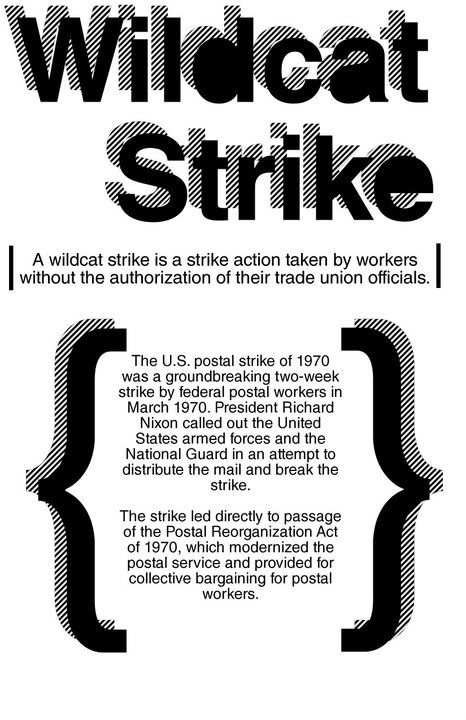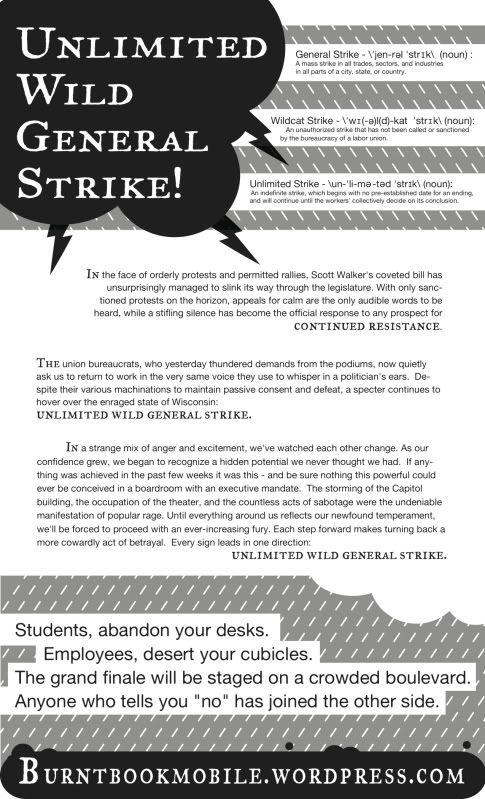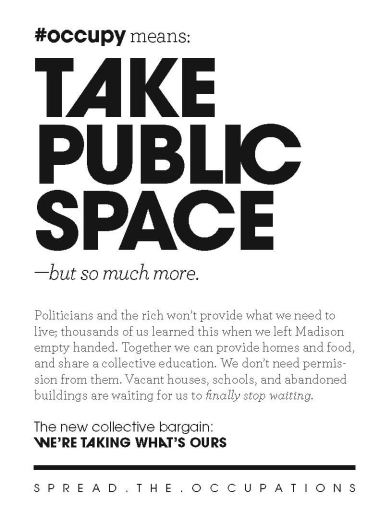An interview with an individual involved in Burnt Bookmobile, a blog out of Milwaukee, Wisconsin run by some people influenced by various anti-authoritarian tendencies, including insurrectionary anarchism, left communism, and nihilism, among others.

Burnt Bookmobile is a blog out of Milwaukee, Wisconsin run by some people influenced by various anti-authoritarian tendencies, including insurrectionary anarchism, left communism, and nihilism, among others. During the spring of 2011, when the 'Wisconsin Uprising' or '#wiunion movement' was in full swing, they put out a number of flyers, leaflets and posters that pushed the occupation or general strike concept forward and contributed to the more militant atmosphere that Madison saw traces of. When I was still in Madison, I tried to stay in touch with at least one person who was involved in running the site, sending updates and perspectives back and forth. Recently I had the chance to make a trip to Milwaukee where they agreed to do an interview.
When was Burnt Bookmobile started and what were the initial thoughts behind it? Have they changed since then?
The Burnt Bookmobile was first started as a distro around 2004 and at the time spent the majority of its activity intervening in the hardcore, punk and counter cultural scenes revolving around the subjects of veganism, a kind of inarticulate post-left anarchism and anti-civ trends of thought. This was an orientation that was largely moral in character, but it would more and more come to reject this for a focus on the question of what constitutes living within capitalism and strategic concerns situated within the struggles which we had found ourselves, such as the end of the anti-globalization era, the anti-war era, consumer politics, alternative identity, and the more general anti-capitalist movement.
Since then the Burnt Bookmobile has been present at wine and cheese festivals, occupied campus buildings, neighborhood block parties, film screenings, lectures, poetry readings, shows, etc. Its mode of intervention has always been primarily through the text, offering things as much as we could for free in the form of zines and posters, and books sold for as much as it costs to restock.
Certainly the content of these texts has gone through different phases reflective of different questions we were thinking through, ideas and practices which resonated with us and which we experimented with. These phases articulated themselves in insurrectionary anarchism, left communism, illegalism, egoism, nihilism, Situationist theory, critical theory and the partisan cannon of philosophy, fiction and poetry. Though obviously contradictory, these traditions form a nexus of ideas that have been useful to us in an effort to think and act out a general antagonism against capitalism.
Do you think the blog has helped introduce local people to communist positions or benefited the projects the local milieu has taken on?
Without a doubt the character of the local projects and the critical tools they employ are indebted to years and years of establishing a more critical and articulate discourse. Whether people read the texts or see the posters, it has produced a certain standard of critical thought within the anti-authoritarian, anarchist, and communist milieu, that must in some way be responded to.
I know this is a big question, but for those unfamiliar, what is Milwaukee like and how does the local situation influence or determine your projects and activity?
I'm no expert on the history of Milwaukee, so these are my reflections. Milwaukee is a Rust Belt city much like other Rust Belt cities and like these cities is a site of former industrial centers of production, the labor of which has been either made redundant through automation, outsourced for cheaper often less skilled labor, or been the subject of more general capitalist restructuring. Milwaukee is also one of the most segregated of the major cities in the US. These are the major dynamics at play within the city. Development in spacial terms certainly happens in Milwaukee, but it happens at a pace much slower than many other cities where value circulation attains a much more ruthless speed. It has a large surplus population pushed into crime and then into the apparatus of law (jail, prison, courts, criminal history, criminalization) that appears extremely racialized.
The Bookmobile responds mostly from the point of the shared positions as points of departure, coming from largely white, heterosexual, middle class, male, student, service industry subjectivities. The project bases its activity within the processes of undoing and active confrontation with these positions in material and symbolic terms. We most easily relate to others who feel ill at ease within these subject positions.
Certainly the question of how to approach those who share a similar disposition of hatred for their conditions and who share similar gestures to respond to them is very pressing. One must assess the risk of vulnerability in exposing one's antagonistic intentions and activities to a general population to find the active minorities that these practices may resonate with. We agree with others who have said that a shared language is built through shared struggle, as counter to the forced relations which already constitute the language of capital. Certain moments with enough force behind them allow for the space of extreme exposure necessary to breakdown barriers of subjectivity allowing for such a language to develop.
We would love to communicate with those who resort to flash mobs out of boredom, who resort to collective crime as mode of resistance to their conditions. Perhaps we'll meet someday in the streets warmed by a burning bank building, but until then a great many things prevent such a convergence.

Leaflet from March 2011
Madison was (and is) sort of a bubble. I kind of had an idea of what was going on in Milwaukee last spring but could you describe what was going on?
Much of what I was involved in was centered on the UW-Milwaukee campus, the prospect of shutting it down to spread the occupations and aid in or initiate a wildcat general strike. The possibility of such a strike seemed more possible than any other time in my life because of all the seemingly unexpected and unprecedented (at least for my time in Milwaukee) activity that was already happening.
The first student initiated rallies were 20 times bigger than anything else I had seen on campus. Many students stopped going to classes, TAs were doing spontaneous sick outs, and everyone was caught in a flurry of going back and forth between the occupation in Madison and Milwaukee. Some teachers, most TAs, and school staff all had the talk of striking or some kind of workplace activity on their lips. The question being posed and discussed by many made the possibility of such a strike and what would be after and beyond a strike all the more tangible. The strategic and immediate importance of what we were doing seemed to carry so much more weight during this moment. It appeared to matter what a couple of extremists were suggesting.
Many people in Milwaukee had already initiated the conversation about campus occupations and had been discussing it since being inspired by the events in California in 2009. Because of this, when the time came to possibly employ occupations here it was mostly a question of strategy and not whether the idea would be accepted by the minority of students and non-students who would initiate it. Student leaders made every attempt to not let the situation get out of their control, but it started out of their control, would have never become what it was if it was in their control, so they found themselves further obsolete. Then, reacting to their obsolescence with further control they were made blatantly absurd by open collective criticism. Out of this occupation would come large discussions on topics ranging from the role of the police to how to support and further strikes, dance parties, many nights spent with little sleep on hard floors, calls for and the planning of other demonstrations, a general sharing of resources and maybe most importantly the collective experience of taking and sharing space. The rest of the occupation was fairly complicated throughout the sixty some days of its stay, and it would take up a lot of room to discuss it, so I won't. What was important was that it was attempted as an effort to spread the occupations and define space on its own terms different from the pacifying "Madison model."
Certainly I can't claim to know much more of what was happening in Milwaukee than what I was in some way connected to or had my ear out for. Other than the university occupation, there was some activity surrounding the end of Good Time within the legislation1 , which included an unruly prison demo at which fireworks were shot at the jail in downtown Milwaukee, people chanted anti-prison slogans and made noise for those inside, then minor property damage was done to the building. Afterwards a big swath of wheatpasting covered mostly the east side of the city with a communique of the action. There was a general assembly, in the Riverwest neighborhood where I live, to address the question of how to support strike and workplace activity. There were multiple larger scale lock gluings of the university and other places connected to important dates, as well as other sporadic acts of vandalism and sabotage. Posters and slogans where everywhere. Strangers talked to strangers about what was happening throughout the state. People involved were constantly in communication, meeting, assembling, etc.

Poster from April 2011
At the time, some of the propaganda you all were putting out seemed to me to be 10 steps ahead of the movement. However, since then, I've changed my mind about this and think one can "meet people where they are at" and introduce what seem like extremely militant ideas. What are your thoughts on accomplishing this?
Compared to what we felt was necessary and what we desired, we were quite restrained in our interventions into he situation in Madison in particular and there was therefore an obvious tension in placing ourselves within discourses and events that were frankly, shameful. The terms with which to engage in struggle were so vapid that all that had never been problematized within the old workers movement (that of workers identity, progressivism, programatism, etc) was still acting as a web of restraint defining the conditions of activity. We felt at the same time a need to act within these events in order to push them to define divisions and limits within what was said and done, then to act against those limits and further the necessary divisions. We wanted to present and proliferate a collective capacity to do this, however minimal our own capacity for proliferation was.
It has been important for us to realize that there was no movement in particular. This idea to enforce and impose the most empty, vague identity, "We Are Wisconsin", upon the mass of angry people who were affected by the event in Wisconsin acted as a means to curtail and defer any modes of resistance beyond the most pacified symbolic acts, calls for legitimacy, family values, and other normative frameworks that are generally always more operative for capitalism than they are for any resistance. A lot more could be said about the function of such an imposition. More than just within the specific event of the Madison occupation we felt a need to provoke and communicate in a way that opened up means of acting rather than defining and containing them; not being any model in particular, but instead spreading that disposition to act and take collectively. This was generally the intention with the posters and activity we were involved in. More so, what we wrote and said was lost in the suppression of event or erased by the victors of the struggle which appear now to be democratic politics. At the time we attempted to offer critical tools to understand and surpass barriers to self-organization outside of the limits of syndcalism, "politics", democracy, work, etc etc. Amidst the now apparent failure of our interventions, they now appear to us to be far too mild and timid.

Occupy related poster circlulating around Milwaukee in October 2011
From far off, it seems Occupy has either not taken off much in Wisconsin or has been absorbed into the recall effort of the Governor. Is this accurate? What has Occupy been like in comparison to what you know of other places?
I'm unfamiliar with what is happening or has happened in Madison regarding the occupy movement, but this has been accurate for Milwaukee, and I assume much more so for Madison. The specter of the recall campaign continues to haunt Wisconsin with counter revolution at a time when much of the rest of the country is experiencing the awkward becomings of open contestation of space and a more generalized resistance to the crisis.
What future 'ruptures' or openings do you see in Milwaukee or the state as a whole?
Frankly I don't see anything interesting coming out of Milwaukee or the state as a whole that resembles anything like what happened in Madison. It will be a surprise when it does, just as the event last spring. It wouldn't have been an event if we would have expected its coming. But the series of crises that are coming won't be resolved easily, won't be swallowed we hope without a fight, so for now we're forced to keep our ear to the ground and be ready for the next round.
Thanks for making time for an interview.
Definitely. Thanks for asking.
- 1The budget bill, which including eliminating collective bargainning for public sector employees and slashing social services and benefits.






Comments
Insurrectionaries, probably a
Insurrectionaries, probably a net good for the left.
Quote: Student leaders made
One could also substitute 'student leaders' for 'FRSO'.
I'm assuming they control
I'm assuming they control what's left of SDS in MKE as they do in Minneapolis?
FRSO? Many at the national
FRSO? Many at the national SDS convention were, yes. It's kind of sad. One of my buddies who is a trot told me that FRSO is doing the whole "boring from within" thing in SDS. They snatched up the coordinating committee and all that. Could just be bullshit, but it wouldn't surprise me. Lots of the FRSO authoritarian types that placed way to much emphasis on national liberation and identity based shit, rather than the totality, yo. Someone was even passing out pamphlets that were super sympathetic to the FARC. Creepy.